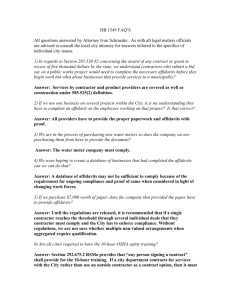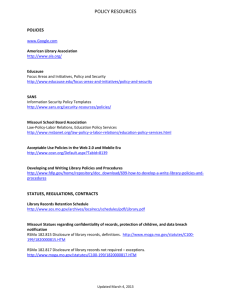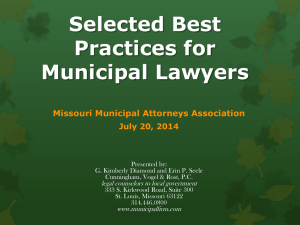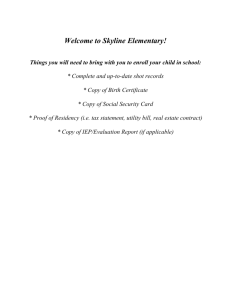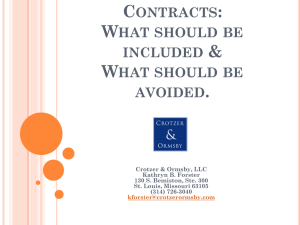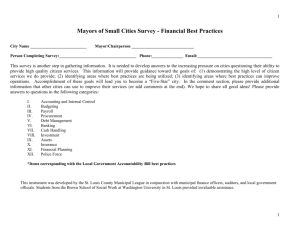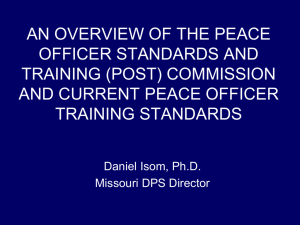Missouri's Sunshine Law
advertisement
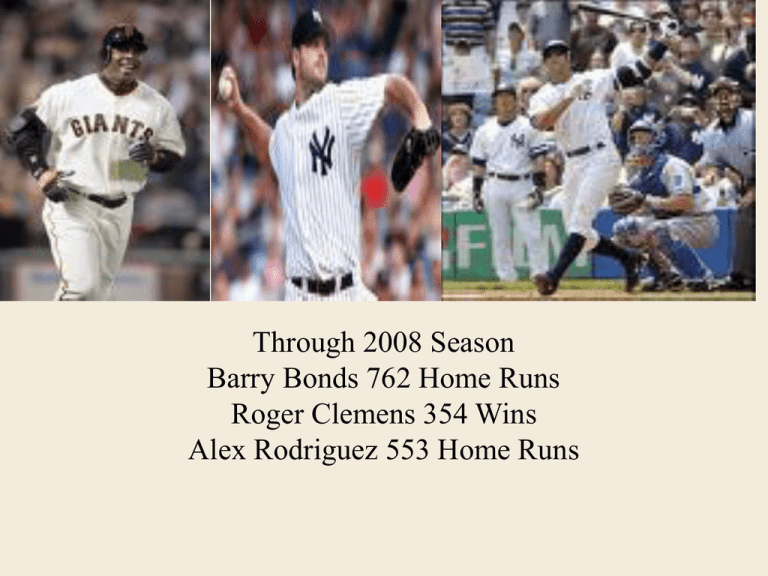
Through 2008 Season Barry Bonds 762 Home Runs Roger Clemens 354 Wins Alex Rodriguez 553 Home Runs • What if Major League Baseball and the Player’s Union had insisted on full disclosure? • Baseball records would have integrity. • The players reputations would be intact. Missouri’s Sunshine Law Chapter 610 Revised Statutes of Missouri 2008 Attorney General Chris Koster • It is our public policy that open records and meetings promote better government. • It is our belief that information is power. • It is our practice that when in doubt, openness prevails. Common Questions Chapter 610 RSMo • What is the Sunshine Law? • Who is subject to the Sunshine Law? • What meetings and records are open to the public? • What are the rules for meetings? • What are the rules for records requests? • How is the Sunshine Law enforced? Public Policy of the Sunshine Law Section 610.011 RSMo • Openness in government: – “It is the public policy of this state that meetings, records, votes, actions, and deliberations of public governmental bodies shall be open to the public unless otherwise provided by law.” (1) • Must be read broadly to favor openness • Exceptions must be read narrowly Who is Subject to the Sunshine Law? Section 610.010 RSMo • Applies to “public governmental bodies” -basically all of state and local government: – – – – – – – State Departments and Elected Officials State Boards and Commissions City Councils County Commissions School Boards and other Special Districts Sub-Committees and Advisory Committees “Quasi-public” bodies: Private entities when contracting with public bodies or performing public services What to the public? Section 610.011 meetings and records are open RSMo • All meetings and records of public bodies are open to the public… • unless a law specifically allows them to be closed. Examples of when a meeting or record may be closed to the public: Section 610.021 RSMo • Litigation; attorneyclient communication • Some personnel records and pending personnel actions • Some pending real estate transactions • Bidding specs until approved • Sealed bids until opened; some pending contract negotiations • Some student records • Existing or proposed security systems • Records otherwise specifically protected by law When may a meeting, vote, or record be closed to the public? Section 610.022 RSMo • Sunshine Law does not require closed meetings or records; just gives an option to close (4) • However, other laws may require confidentiality for specific records or meetings What meetings are subject to the Sunshine Law? Section 610.010 RSMo • Any meeting at which public business is discussed or decided (5) • What is “public business?” (3) – All matters related to the body’s functions or the conduct of its business • Includes phone conference, internet chat (6) • Generally, quorum must be present 610.015 RSMo • Limited exception for social gatherings 610.010.5 RSMo What notices are required? Section 610.020 RSMo • Notice of an open meeting must contain: (1) – Date and time of meeting – Place of meeting – Tentative agenda • Enough to reasonably advise public of matters to be considered (1) • Practice tip: indicate time notice is posted What notices are required? Section 610.020 RSMo • Notice of a closed meeting must contain: 610.022.2 RSMo – Date and time of meeting – Place of meeting – Reason for closing the meeting • Must refer to the specific provision of law that allows the meeting to be closed: 610.022.3 RSMo What notices are required? Section 610.020 RSMo • Posted at public body’s main office – Or if there is no office, at the meeting location – Posted on web site if meeting via the Internet • At least 24 hours in advance (2) – Weekends and holidays don’t count – News media get special notice on request (1) • Emergency meetings (4) – Less than 24 hours notice, but only for good cause, stated in the minutes Where can meetings be held? Section 610.020 RSMo • Reasonably accessible to the public (2) • Large enough to accommodate anticipated attendance (2) • Designated location to listen to telephone or internet meetings (1) • Public can record open meetings, if unobtrusive (3) • Recording a closed meeting requires permission of the body (3) What minutes are required? Section 610.020 RSMo • Open and closed meetings must have minutes showing: (7) – – – – date and time place members present and absent record of votes taken • For roll call votes, minutes must show how each member voted (7) • With certain exceptions, elected members must vote in person: Section 610.015 RSMo How is a closed meeting conducted? Section 610.022 RSMo • Must be announced in advance at an open meeting (1) – Roll call vote to close the meeting – Identify specific provision of law that allows meeting to be closed • Can discuss only business directly related to the reason given for closing the meeting (3) • Votes must be roll calls; each vote recorded 610.020.7 RSMo • Member may object to closure of a meeting 610.022.6 RSMo What records are subject to the Sunshine Law? Section 610.010 RSMo • • • • Any record of a public body (6) Any record retained by a public body Written or electronic records Email from a member to a quorum of a public body - copy must be sent to the custodian: Section 610.025 RSMo • Practice tip: A request for information is different from a request for records. (e.g., list of business licensees vs. copies of licenses) Who responds to records requests? Section 610.023 RSMo • Custodian of records (1) – responds to requests – maintains records - Safeguards records • Custodian’s name and location must be available upon request What are the deadlines for responding to records requests? Section 610.023 RSMo • Must respond as soon as possible and no more than 3 business days after custodian receives request (3) • If records are not available in that time, custodian must explain delay and state when records will be available (3) • Time for providing access may exceed 3 days for reasonable cause (3) What happens if records are closed? Section 610.023 • If asked, custodian must explain in writing why records are closed – must state specific provision of law allowing records to be closed (4) – must provide explanation within 3 business days of being asked for it (4) What happens if records are closed? Section 610.024 RSMo • If one record has both open and closed material, must separate and provide access to the open material (1) • Must try to design records to facilitate separation of open and closed material (2) What fees can be charged for copies of records? Section 610.026 RSMo • Fees cannot exceed $.10 per copy for 9 X 14 or smaller pages, plus search time (1) • Research time may be billed at actual cost (1) • Persons may request an estimate of the cost (1) • Advance payment of fees can be requested (2) • Fees may be reduced or waived in the public interest (1) How is the Sunshine Law enforced? Section 610.027 RSMo • Attorney General, prosecutors, and citizens can sue in circuit court of public body (1) • Civil fines up to $1000 for knowing violations (3) • Civil fines up to $5000 and attorneys’ fees for purposeful violations (4) – Court can fine body or individual members • When in public interest, court can void actions taken in violation of the Sunshine Law (5) Want More Information? • Attorney General’s Sunshine Law booklet • Attorney General’s web site: http://www.ago.mo.gov – Summaries and guidance about the law – Links to statutes and Attorney General Opinions – Sample forms for requests and compliance • Attorney General’s Office: 573-751-3321 Tom Durkin Public Education Director Attorney General’s Office 573-751-8843 Tom.Durkin@ago.mo.gov
